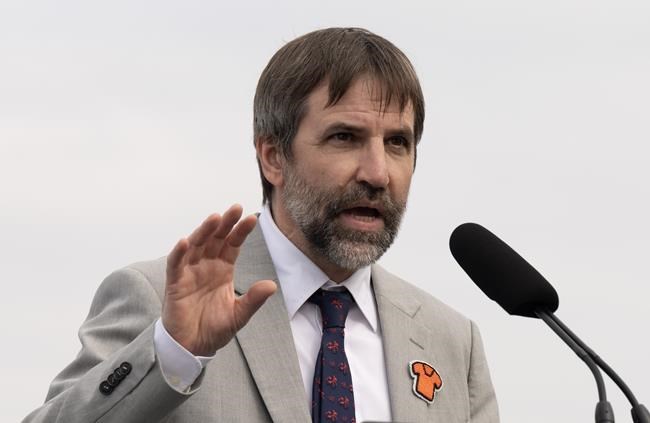OTTAWA — There will be no special treatment for Alberta when it comes to Canada's incoming regulations to make electricity cleaner, Environment Minister Steven Guilbeault said Friday.
The comments are the latest salvo in the seemingly never-ending battle between Alberta and Ottawa over climate policy.
This one relates to new clean electricity regulations that Guilbeault published in draft form in August. The regulations will require all electricity to be from either renewable sources, like wind or hydro, or equipped with carbon-capture technology by 2035.
Both Alberta and Saskatchewan have said that that is simply not doable, and they are instead targeting 2050 as the date for full emissions-free electricity.
The two provinces still rely heavily on fossil fuels — natural gas for Alberta and coal and gas for Saskatchewan — to make power, and they say they can't eliminate those or build enough carbon capture without hurting reliability or costing their residents a fortune.
Alberta Premier Danielle Smith Thursday said she will use her province's sovereignty act to challenge any attempt by Ottawa to enforce that deadline. Her comment came after an Alberta Electric System Operator issued a report warning about the possibility of blackouts if the federal regulations are enforced.
The report did not explain how that conclusion was reached. But Smith is in full-scale attack mode, launching a widespread advertising campaign, including outside of Alberta, asking people to tell Ottawa not to let Albertans freeze in the dark.
Guilbeault disputes that the regulations will put undue costs or cause reliability problems anywhere. He said he wants to work with all provinces and territories to make sure the regulations work for everyone and also reduce emissions.
"I would call on Premier Smith to work with us constructively to ensure that these regulations are the most efficient for all Canadians," Guilbeault said during a news conference on an unrelated topic in Ottawa Friday.
He said while the regulations are still in the consultation stage, and adjustments can still be made, there will not be a carve-out that exempts Alberta.
"How fair would it be for ... the rest of the federation if we started carving out exceptions for provinces?" he said.
"We didn't do it for pricing. We worked with all provinces to ensure that we had a fair and equitable system when it came to pricing, and we will do the same for the clean electricity regulations."
Alberta and Saskatchewan, along with Ontario, launched court challenges of Ottawa's authority to impose a carbon price, arguing it impeded their jurisdictions from developing their natural resources as they see fit.
Ultimately, the Supreme Court of Canada sided with Ottawa, ruling that climate change and emissions cross provincial borders, so Ottawa has jurisdiction to implement a carbon price.
The Sovereignty Act, which Smith passed in Alberta almost a year ago, would allow the province to reject federal laws or regulations when the province thinks they cause harm to Alberta. It has not been tested in court.
This report by The Canadian Press was first published Sept. 29, 2023.
Mia Rabson, The Canadian Press



